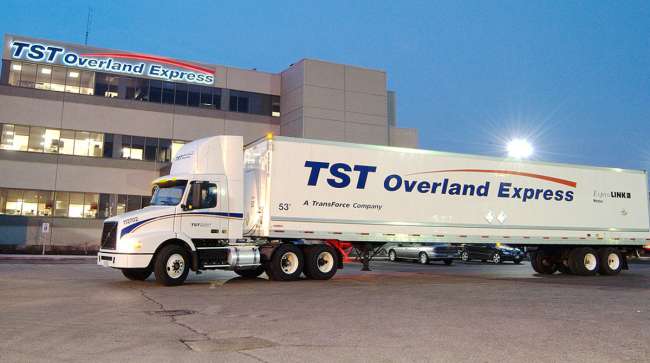Contributing Writer
TFI Posts Solid Q1 Results; Workforce Measures Taken

[Stay on top of transportation news: Get TTNews in your inbox.]
TFI International Inc. posted a strong first quarter, logging record operating income for the period and solid profit growth.
But the Montreal-based truckload and logistics company said April 22 that it saw a plunge in business during the last two weeks of March and early April as the recession caused by the coronavirus pandemic set in.
Still, Alain Bédard, TFI’s chairman and CEO, told investors and analysts on a conference call that he expected the company to remain profitable in the second quarter and is hopeful for an economic rebound in the second half of the year as businesses in Canada and the U.S. reopen.
“We have navigated through storms before. We will navigate through this one,” Bédard said.

Bédard
TFI’s first quarter net income rose 16.4%, to C$75.8 million compared with C$65.1 million in the same period a year earlier. TFI posted 88 Canadian cents in diluted earnings per share compared with 74 cents in the same quarter of 2019.
Operating income rose to a record C$118.5 million in the quarter, a 13% gain from C$104.9 a year earlier. The company attributed the gain to business acquisitions, strong execution and cost efficiencies.
Despite the onset of the coronavirus pandemic recession during the quarter, TFI’s revenue grew 0.8%, to C$1.24 billion from C$1.23 billion.
As the pandemic spread in early March, TFI’s executive team developed a plan to slash expenses to remain profitable at a reduced level of business.
Cost savings include a wage reduction of 5% to 15% for executives and a 15% reduction in directors’ fees.
TFI also slashed its workforce by 1,633 employees who it hopes to rehire, but a company spokesman said that depends on the pace of economic recovery once the pandemic eases. The company also cut expenses by reducing the workweek for 1,084 employees to four days.
As of March 31, TFI employed 16,768 across North America, a 4.6% decline from the 17,604 it employed a year earlier.
TFI also suspended all capital expenditures. It is taking delivery of some tractors and trailers in the current quarter but has canceled all purchases for the second half of the year. That will save about C$60 million, Bédard said.
The company, which purchased the courier services operations of R.R. Donnelley & Sons Co. in March and is an active player in the acquisitions business, won’t be making any more major transactions this year, Bédard said.
“It is too risky,” he said. “Nobody knows how long this virus will be with us.”
But the company may do some small deals, especially in Canada, purchasing distressed businesses that are looking for exits.

Although TFI is based in Canada, it also operates in the U.S. and Mexico. Two of TFI’s four business segments achieved higher quarterly operating income than a year earlier. The operating performance of its various units was affected by how quickly different areas of the North American economy shrank as regional and national governments closed businesses and took actions to contain the virus.
Truckload operating income rose more than 24.2%, to C$63 million from C$50.7 million in the same quarter a year earlier. Revenue for the segment shrank 4% during the last two weeks of March compared with the same period a year earlier and 20% for the first two weeks of April, Bédard said.
Operating income in TFI’s logistics segment surged 71% to C$26 million compared with C$15.2 million a year earlier. Its revenue gained as consumers shifted purchases to e-commerce over the past month. Logistics revenue grew 39% during the last half of March and 12% during the first two weeks of April.
Profits in TFI’s package and courier business sagged 26.2% to C$15.5 million from C$21 million a year earlier. The economic effects of the pandemic have hit the segment hard, Bédard said. Business delivering inventory to retail establishments and services providers such as dentists and optometrists has plunged, he said. Revenue for the segment dropped 28% during the last two weeks of March and 30% in early April.

Much of the trucking industry relies on older onboard technology for critical functions, which can hurt reliability and efficiency. So is it time for fleets and their technology vendors to implement faster replacement cycles for onboard tech? Seth Clevenger talks to Ray Greer of Omnitracs and Deryk Powell of Velociti. Hear a snippet, above, and get the full program by going to RoadSigns.TTNews.com.
Operating income in the less-than-truckload segment also fell, diving 35.9%, to C$17.7 million from C$27.6 million. Revenue fell 17% during the last two weeks of March and 39% in the first two weeks of April.
Bédard said TFI ended the first quarter in a good financial position. It had C$130 million in cash, C$830 million on a revolving debt facility and no debt maturities until June 2021.
“That will help TFI quickly snap back and emerge even stronger once the operating environment improves,” Bédard said.
The company raised C$305 million in a stock offering earlier this year.
TFI International ranks No. 10 on the Transport Topics Top 100 list of the largest for-hire carriers in North America.
Want more news? Listen to today's daily briefing:




